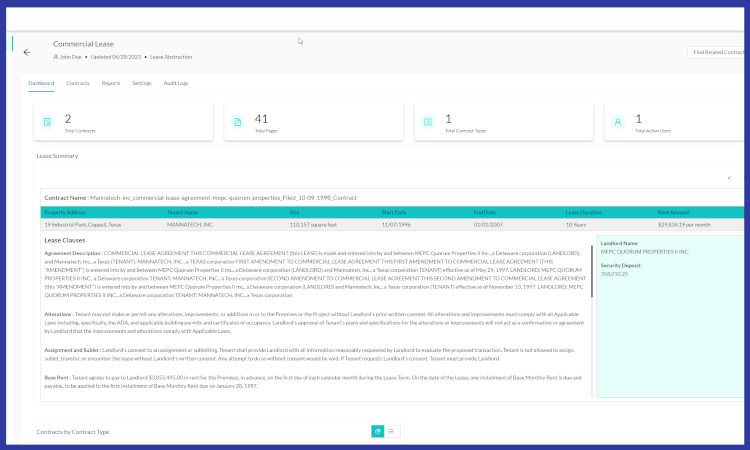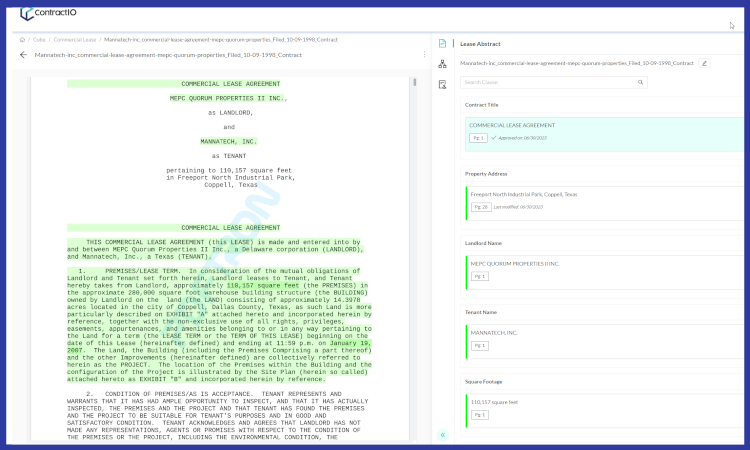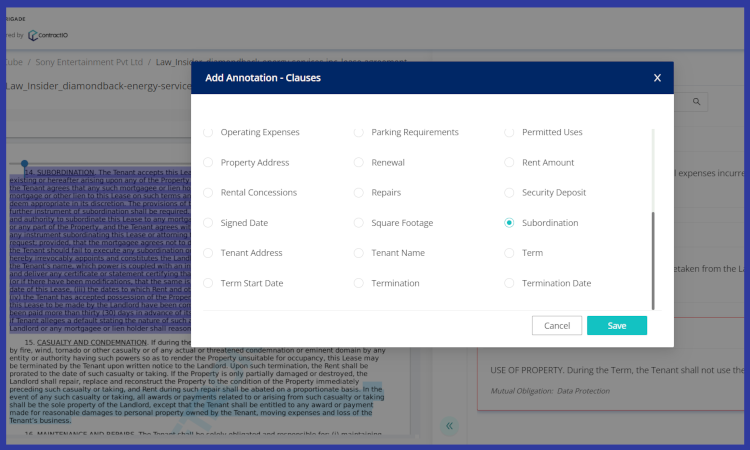Commercial Real Estate Lease Due Diligence
Reviewing and negotiating the most favorable commercial real estate lease terms can often mean the difference between profit and loss. With numerous stakeholders involved—landlords, tenants, property managers, real estate brokers—the ability to assess information relevant to each is paramount for informed decision making.
By automating the lease abstraction, review and analysis process, Cube empowers users to quickly identify risks and opportunities, streamlining the review process of lease agreement terms and obligations. Our AI-powered platform zeroes in on real-estate specific language and terminology, with a customized approach to local zoning laws that makes every Cube review relevant and on-point.



- Improve compliance: By eliminating the resources associated with manual reviews, Cube is cost effective, extracting more than 75 clauses and critical information, including detailed metadata, from contracts in just minutes.
- Increase productivity: Automation speeds the review of lease agreements, saving time and resources.
- Enhance accuracy: Cube minimizes the mistakes associated with human error, leading to more informed decision making.
.svg)

Reviewing and negotiating the most favorable commercial real estate lease terms can often mean the difference between profit and loss. With numerous stakeholders involved—landlords, tenants, property managers, real estate brokers—the ability to assess information relevant to each is paramount for informed decision making.
By automating the lease abstraction, review and analysis process, Cube empowers users to quickly identify risks and opportunities, streamlining the review process of lease agreement terms and obligations. Our AI-powered platform zeroes in on real-estate specific language and terminology, with a customized approach to local zoning laws that makes every Cube review relevant and on-point.
The ContractIO AI-Powered Contract Intelligence Advantage
Improve Compliance
Cube extracts more than 75 clauses and critical information from leases to ensures a more consistent and accurate compliance oversight.
Increase productivity
Automation boosts productivity by speeding up lease reviews, saving time, and freeing resources for strategic tasks.
Enhance Accuracy
Cube minimizes the mistakes and enhances accuracy by reducing human errors, ensuring precise data for better decision-making.
Frequently Asked Questions
What is Lease Abstraction?
Lease abstraction is the process of extracting essential information from a lease agreement and summarizing it into a structured format. This typically involves identifying key terms, obligations, dates, and financial details outlined in the lease document. Lease abstraction is crucial for organizations managing large portfolios of leases, as it streamlines data organization and facilitates analysis and decision-making.
What is AI Lease Abstraction?
AI Lease Abstraction is the process of using artificial intelligence and machine learning techniques to extract and summarize key information from lease agreements, such as lease terms, obligations, and clauses. This technology automates what was traditionally a manual and time-consuming task, enabling real estate professionals, property managers, and businesses to efficiently manage their lease portfolios and make informed decisions.
What are the most important clauses or fields to include in a lease abstract?
The most important clauses or fields to include in a lease abstract typically include:
- Lease Term: Start and end dates of the lease agreement.
- Rent Payment Terms: Details regarding rent amount, frequency, escalation clauses, and any incentives or discounts.
- Property Description: Description of the leased property, including location, size, and any specific identifiers.
- Tenant Information: Identification of the tenant(s), including contact details and any specific responsibilities or rights.
- Use Clause: Stipulations regarding how the leased property can be used by the tenant.
- Maintenance and Repairs: Responsibilities for property maintenance, repairs, and alterations.
- Renewal and Termination Options: Options for lease renewal, termination, or assignment.
- Insurance Requirements: Details of insurance coverage required by the tenant or landlord.
How does AI lease abstraction save money?
AI lease abstraction saves money through:
-
Efficiency Gains: AI algorithms can process lease documents much faster than humans, reducing the time and resources required for abstraction.
-
Reduced Labor Costs: By automating the abstraction process, organizations can lower labor costs associated with manual data entry and review.
-
Minimized Errors: AI tools offer higher accuracy in extracting and interpreting lease data, reducing the risk of costly errors often found in manual abstraction.
-
Streamlined Operations: Automated abstraction streamlines the workflow, enabling real estate professionals to handle larger volumes of leases with greater efficiency, thus saving operational costs.
-
Improved Decision-Making: AI-powered abstraction provides comprehensive insights into lease agreements, enabling better-informed decisions regarding lease negotiations, renewals, and portfolio management, potentially leading to cost savings.
-
Enhanced Compliance: AI tools can help ensure regulatory compliance by accurately identifying and flagging clauses relevant to legal and regulatory requirements, mitigating the risk of fines or penalties.
-
Opportunity Identification: AI can uncover hidden opportunities for cost optimization within lease agreements, such as identifying clauses for renegotiation, reducing unnecessary expenses, or maximizing revenue potential, leading to significant cost savings over time.
How accurate are AI lease abstractions?
The accuracy of AI lease abstractions can vary depending on the complexity of lease documents. Generally, our well-trained AI models can achieve a high level of accuracy in extracting key lease terms and clauses. However, it's important to acknowledge that no AI system is flawless, thus prompting the need for manual review or correction to ensure accuracy, particularly in instances involving unusual or ambiguous lease language. Continuous refinement and improvement of AI algorithms contribute to enhancing accuracy over time.
